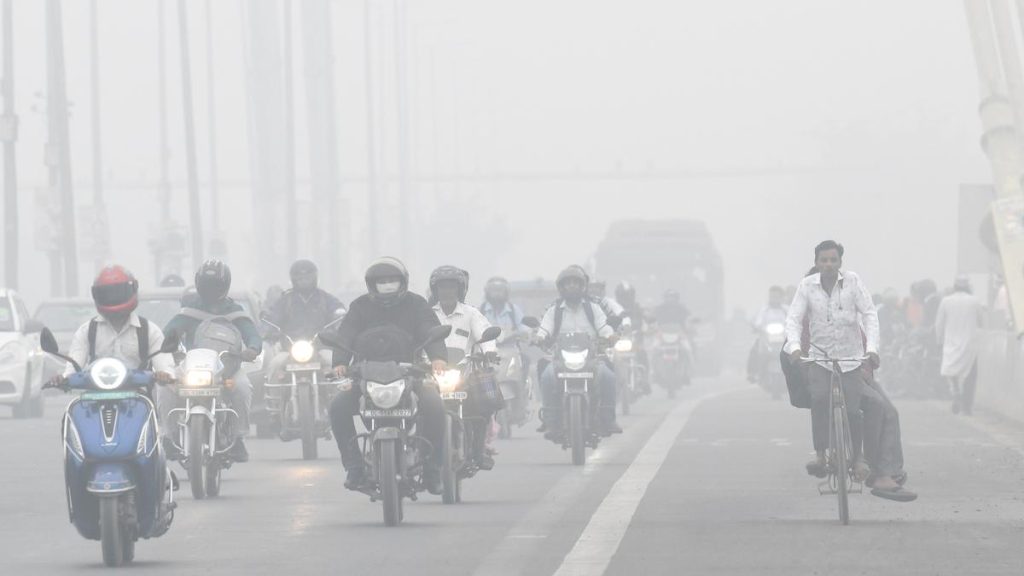On 18th November, 2024, the Delhi’s overall Air Quality Index (AQI) worsened to 493, according to Central Pollution Control Board (CPCB) data.
- The overall level of PM2.5 (a chief pollutant) in Delhi was 401.1 micrograms per cubic meter – about 26.74 times the WHO’s permissible limit of 15 micrograms per cubic meter for a 24-hour period.
Reasons
- The smog (a toxic blend of smoke and fog) occurs each year in winter as cold air traps dust, emissions, and smoke from illegal farm fires in some surrounding states.
- Surface temperature inversions are the strongest especially during the winter. Pollutants from vehicles, wood burning, area sources, and industry become trapped near the ground during inversions, leading to poor air quality.
- PM2.5 concentrations build the longer the inversion lasts and can reach unhealthy levels.
- Farm fires (stubble burning) have contributed as much as 40% of the pollution in Delhi, as per SAFAR (weather forecasting agency under Ministry of Earth Sciences).
Government Actions
- Commission for Air Quality Management (CAQM) issued directions for implementing Graded Response Action Plan (GRAP).
- GRAP is a set of emergency measures that kick in to prevent further deterioration of air quality once it reaches a certain threshold in the Delhi-NCR region.
- GRAP was approved by the Supreme Court in 2016 and notified in 2017.
- GRAP is incremental in nature and thus, when the air quality dips from ‘poor’ to ‘very poor,’ measures listed under both sections must be followed.
- Stage I – Activated when the AQI is in the ‘poor’ category (201 to 300)
- Stage II – AQI in the ‘very poor’ category (301-400)
- Stage III – AQI is the ‘Severe’ category (401-450)
- Stage IV – AQI is the ‘Severe +’ category (more than 450)
Measures under GRAP IV:
- Stop entry of truck traffic into Delhi, except for those carrying essential commodities or providing essential services. Trucks running on LNG, CNG, electric, or BS-VI diesel are allowed to enter.
- Ban the entry of LCVs registered outside Delhi, except those that are electric, CNG, or BS-VI diesel, and those carrying essential commodities or providing essential services.
- Strictly prohibit Delhi-registered BS-IV and below diesel-operated Medium Goods Vehicles (MGVs) and Heavy Goods Vehicles (HGVs), except those delivering essential services.
- Extend the ban on all construction and demolition activities, including linear public projects such as highways, roads, flyovers, overbridges, power transmission, pipelines, and telecommunications.
- NCR state governments and Delhi may decide to discontinue physical classes for classes VI-IX and XI, moving to online lessons.
- Delhi and NCR state governments may implement a 50% workforce capacity for public, municipal, and private offices, with the rest working from home.
- The central government may allow work from home for employees in central government offices during this period.
- State governments may consider further measures, such as closing colleges, educational institutions, non-essential commercial activities, and implementing an odd-even scheme for vehicle movements.
Health Advisory
- Vulnerable Groups: Children, the elderly, and individuals with respiratory, cardiovascular, cerebrovascular, or other chronic diseases are advised to avoid outdoor activities and stay indoors as much as possible to minimize exposure to toxic air.
Type of pollutants and recommended guideline value by WHO


